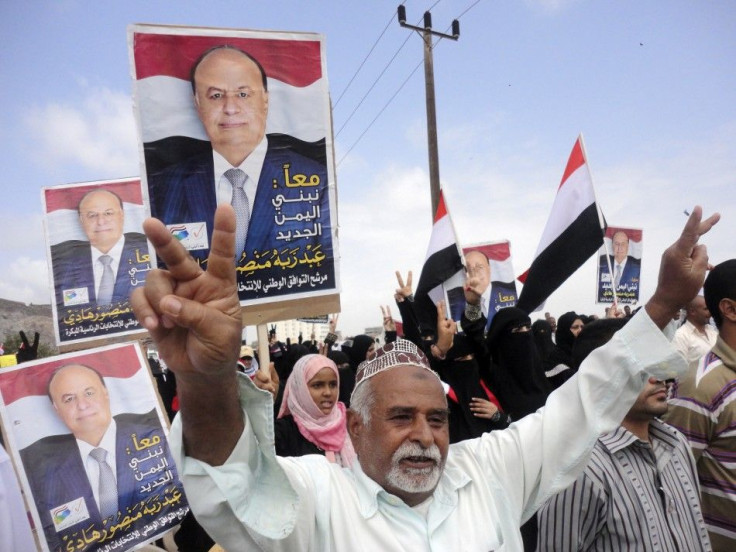Yemen's New Leadership Struggles With Old Set of Problems

Hours after Yemen’s new President Abdurabu Mansur Hadi took office, al-Qaeda network launched a massive suicide bomb attack in the country to signal the arrival of the new, democratic era in the strife-torn country.
After taking office, Hadi proclaimed that taking on al-Qaeda was the “religious and national duty” of the Yemeni people. He said the war against Al-Qaeda will be continued as a religious and national duty and that the next phase in the country's life “requires serious dialogue that would shape the features of the future rule though a new constitution that meets national aspirations.”
Al-Qaeda responded in hours, taking the lives of 26 Republican Guard troops in a daring attack outside the presidential palace in al Mukalla in Hadramawt governorate. The suicide attack showed the “religious and national duty rhetoric would ring hollow if the new leadership did not immediately win back the ground lost to al-Qaeda in the last ten years.
As for the nation's democratic aspirations, Hadi found thousands of people marching to his palace on Monday, when he held a joint appearance with the ousted leader, Ali Abdullah Saleh. It is said the rump of the hated Saleh regime is still the core of the incoming administration, with Saleh's sons and family members holding important posts in the new regime, especially in the security forces.
The protesters wanted Saleh's prosecution and were outraged by Hadi's public appearance with the ex-President, who handed a Yemeni flag to Hadi at the ceremony. Saleh, who was awarded a controversial immunity as part of the deal under which he stepped down, is leaving for Ethiopia.
However, he has said he will retain his position as the leader of the General People's Congress (GPC), the ruling party to which Hadi belongs. This raises suspicion among people if the old legacy will continue to haunt them. Moreover, the sons and nephews of Saleh still hold important positions within the security forces.
A Washington Post report says the leaders of the year-long anti-regime protests have found no role in the incoming administration. Until now, the students and civil society leaders who started Yemen’s revolution a year ago, and who have survived bloody attacks by Mr. Saleh’s forces, have been left out of the transition plan, the Post reported.
So much about change. What about democracy? Hadi solemnly said his ascension to the presidency will herald changes and that within two years, Yemen will see a new president. Time will tell.
He garnered 99.8 percent of votes in the Presidential election that was hailed and flaunted by the Yemeni people as the sign of the onset of democracy. The vote share was statistically baffling, but this brand of democracy had only one man on the ballot, Hadi himself.
Apart from ushering in democracy, the other challenge ahead for the new regime is to fight al-Qaeda effectively.
The terror network founded by Osama bin-Laden has its strongest base in Yemen. Despite the U.S. and Yemeni government's efforts and continued drone attacks targetting terror leaders, the Al-Qaeda in Arabian Peninsula (AQAP), has thrived in the country.
In the last 10 years of close Yemeni-U.S. partnership in fighting al-Qaeda in the peninsula, the terror network was not rooted out. Though the U.S. drone strikes routinely killed al-Qaeda leaders like Anwar al-Awlaki and blew up terror cells, the network was still able to plot and carry out attacks. Two of the biggest recent plots were the attempt to bomb cargo planes in October 2010 and the plot to bring down Northwest Airlines Flight 253 from Amsterdam to Detroit on Christmas Day 2009.
Hadi's main task is to channel the U.S. aid in the right direction and reduce corruption in the counterterrorism establishment. The New York Times reported that the U.S. counterterrorism adviser, John O. Brennan, plans to bring in changes that would make the Yemeni counterterrorism department more effective.
“We’re trying to ensure that the aid is very tailored, so it goes to those units that are professional, that fall within a command and control structure that reports to Hadi, that are addressing Al Qaeda and domestic threats to Yemen, and are not engaged in any political shenanigans,” the NYT quoted Brennan as saying.
But the removal of the Saleh loyalists from the security establishment, a long-standing demand of the people, will weaken the counterterrorism operations, analysts have pointed out.
“Continued violence throughout Yemen, markedly Saturday’s deadly bombing in al Mukalla, will challenge the new Yemeni government. Moreover, protesters are now calling for the complete removal of the Saleh family from the government and security forces. Saleh family members hold top positions in the security forces and their removal could be a blow to American counter-terrorism efforts,” the American Enterprise Institute said in a statement.
© Copyright IBTimes 2024. All rights reserved.





















